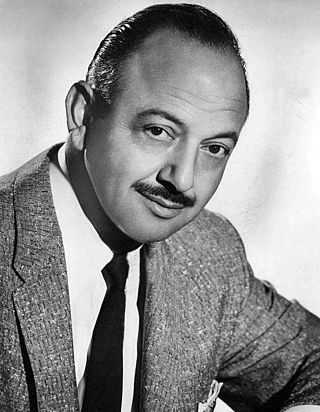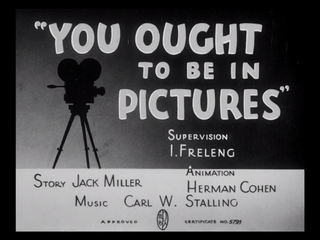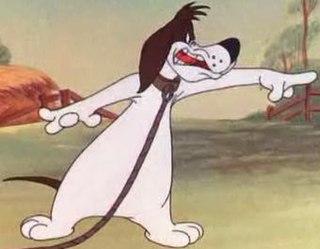
Melvin Jerome Blanc was an American voice actor and radio personality whose career spanned over 60 years. During the Golden Age of Radio, he provided character voices and vocal sound effects for comedy radio programs, including those of Jack Benny, Abbott and Costello, Burns and Allen, The Great Gildersleeve, Judy Canova, and his own short-lived sitcom.

Looney Tunes is an American animated franchise produced and distributed by Warner Bros. It began as a series of short films that originally ran from 1930 to 1969, along with its partner series Merrie Melodies, during the golden age of American animation. Following a revival in the late 1970s, new shorts were released as recently as 2014. The two series introduced a large cast of characters, including Bugs Bunny, Daffy Duck, and Porky Pig. The term Looney Tunes has since been expanded to also refer to the characters themselves.

Daffy Duck is a fictional character created by animators Tex Avery and Bob Clampett for Leon Schlesinger Productions. Styled as an anthropomorphic black duck, he has appeared in cartoon series such as Looney Tunes and Merrie Melodies, in which he is usually depicted as a foil for either Bugs Bunny, Porky Pig or Speedy Gonzales. He was one of the first of the new "screwball" characters that emerged in the late 1930s to replace traditional everyman characters who were more popular earlier in the decade, such as Mickey Mouse, Porky Pig, and Popeye.

Porky Pig is an animated character in the Warner Bros. Looney Tunes and Merrie Melodies series of cartoons. He was the first character created by the studio to draw audiences based on his star power, and the animators created many critically acclaimed shorts featuring the character. Even after he was supplanted by later characters, Porky continued to be popular with moviegoers and, more importantly, the Warners directors, who recast him in numerous everyman and sidekick roles.

Speedy Gonzales is an animated cartoon character in the Warner Bros. Looney Tunes and Merrie Melodies series of cartoons. He is portrayed as "The Fastest Mouse in all Mexico" with his major traits being the ability to run extremely fast, being quick-witted and heroic while speaking with an exaggerated Mexican accent. He usually wears a yellow sombrero, white shirt and trousers, and a red kerchief, similar to that of some traditional Mexican attires. To date, there have been 46 theatrical shorts made either starring or featuring the character.

Leon Schlesinger was an American film producer who founded Leon Schlesinger Productions, which later became the Warner Bros. Cartoons studio, during the Golden Age of American animation. He was a distant relative of the Warner Brothers. As head of his own studio, Schlesinger served as the producer of Warner's Looney Tunes and Merrie Melodies cartoons from 1930, when Schlesinger assumed production from his subcontractors, Harman and Ising, to 1944, when Warner acquired the studio.

Merrie Melodies is an American animated comedy short film series distributed by Warner Bros. Pictures. It is the partner series to Looney Tunes and featured many of the same characters. It originally ran from August 2, 1931, to September 20, 1969, during the golden age of American animation, though it was revived in 1979, with new shorts sporadically released until June 13, 1997. Originally, Merrie Melodies placed emphasis on one-shot color films in comparison to the black-and-white Looney Tunes films. After Bugs Bunny became the breakout character of Merrie Melodies and Looney Tunes transitioned to color production in the early 1940s, the two series gradually lost their distinctions and shorts were assigned to each series randomly.

Richard Ewing Powell was an American actor, singer, musician, producer, director, and studio head. Though he came to stardom as a musical comedy performer, he showed versatility and successfully transformed into a hardboiled leading man, starring in projects of a more dramatic nature. He was the first actor to portray private detective Philip Marlowe on screen.

Petunia Pig is an animated cartoon character in the Looney Tunes and Merrie Melodies series of cartoons from Warner Bros. She looks much like her significant other, Porky Pig, except that she wears a dress and has pigtailed black hair.

Porky's Hare Hunt is a 1938 Warner Bros. Looney Tunes animated short film directed by Ben "Bugs" Hardaway and an uncredited Cal Dalton, which stars Porky Pig as a hunter whose quarry is a little white rabbit. The short was released on April 30, 1938.

Daffy Duck's Quackbusters is a 1988 animated compilation film featuring classic Warner Bros. Cartoons shorts and animated bridging sequences, starring Daffy Duck. The film was released to theaters by Warner Bros. on September 24, 1988. It was the final theatrical production in which Mel Blanc provided the voices of the various Looney Tunes characters before his death in July 1989.

I Love to Singa is a 1936 Warner Bros. Merrie Melodies animated cartoon directed by Tex Avery. The short was released on July 18, 1936.

You Ought to Be in Pictures is a 1940 Warner Bros. Looney Tunes short film directed by Friz Freleng. The cartoon was released on May 18, 1940, and stars Porky Pig and Daffy Duck.

Drip-Along Daffy is a 1951 Warner Bros. Merrie Melodies theatrical cartoon short, directed by Chuck Jones and written by Michael Maltese. The cartoon was released on November 17, 1951, and stars Daffy Duck and Porky Pig.
"The Merry-Go-Round Broke Down" is a song written in 1937 by Cliff Friend and Dave Franklin and published by Harms Inc., New York. It is best known as the theme tune for the Looney Tunes cartoon series and Merrie Melodies reissued cartoon series produced by Warner Bros. Cartoons, used from 1937 to 1969.

My Favorite Duck is a 1942 color Warner Bros. Looney Tunes cartoon directed by Chuck Jones, in his second collaboration with writer Michael Maltese. The cartoon was released on December 5, 1942, and stars Daffy Duck and Porky Pig. It was the second color entry in the Looney Tunes series, and the first pairing of Porky and Daffy produced in Technicolor.
"Singing in the Bathtub" is a song written in 1929 by Michael H. Cleary, with lyrics by Herb Magidson and Ned Washington for the film The Show of Shows. The Show of Shows was Warner Bros.' answer to MGM's The Hollywood Revue of 1929, and "Singing in the Bathtub" spoofs Hollywood Revue's song "Singin' in the Rain". In Show of Shows, the number features an enormous bathtub and is performed by Winnie Lightner and a chorus of male performers wearing antiquated bathing suits.
Daffy Duck and Porky Pig Meet the Groovie Goolies is a 1972 animated one-hour TV-movie that was aired on December 16 as an episode of the anthology series The ABC Saturday Superstar Movie. In this Filmation-produced movie, Daffy Duck, Porky Pig, and other Looney Tunes characters interact with the characters from the Filmation series Groovie Goolies.

Barnyard Dawg is a Looney Tunes character. A feisty anthropomorphic basset hound, he is a friend and the archenemy of Foghorn Leghorn. He was created by Robert McKimson, who also created Foghorn, and was voiced by Mel Blanc. Dawg also feuds with other enemies as well like Henery Hawk, Daffy Duck and Sylvester. He appeared in 23 Golden Age–era Warner Bros. shorts.















